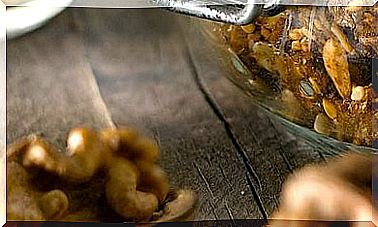Polycystic Ovaries: The Best Natural Remedies
Behind PCOS or polycystic ovarian syndrome is caused by a hormonal imbalance. Some plants and natural supplements can help improve symptoms.

The polycystic ovary syndrome (PCOS) is a result of certain hormonal imbalances that often affect young women. In addition to symptoms such as menstrual imbalances or hair loss, it is associated with infertility problems. Knowing what it is and what its main causes are can help to better define the most appropriate treatment for each woman.
What is Polycystic Ovarian Syndrome (PCOS): Symptoms and Possible Causes
Polycystic ovary syndrome is characterized by hormonal imbalance with a predominance of androgens. This causes that the follicles do not develop correctly and are encapsulated. Thus, the characteristic cysts of this disorder are formed.
The formation of cysts in the ovaries can cause ovulation failure, as the eggs do not reach the degree of maturity necessary to be released. This translates into one of the most common symptoms of polycystic ovaries: irregular bleeding.
The excess of the hormone testosterone in the blood is the cause of other common symptoms:
- Appearance of body hair
- Hair loss
- Seborrheic acne
- Hirsutism
We can establish two main causes of polycystic ovary syndrome. One of them is insulin resistance. The other a hypothalamic disorder.
1. Insulin resistance
Insulin resistance causes hyperglycemia that increases luteinizing hormone (LH) levels. High LH levels, in turn, lead to an increase in androgens.
If, in addition, there is a mutation of the CYP450c17A enzyme, insulin resistance will occur in the ovary and the passage of progesterone to androstenedione, a precursor hormone of testosterone, will increase. In this case, the symptoms will be more severe and difficult to treat.
If this mutation does not occur, it is easier to reverse the symptoms just by improving diet and increasing physical exercise.
2. Hypothalamic disorders
The hypothalamus is a brain gland that regulates many bodily functions, including making gonadotropin-releasing hormone (GnRH). This hormone stimulates the pituitary gland to secrete FSH and LH in turn.
If there is a failure in this mechanism, the release of GnRH will be impaired. There is usually an increase in hormonal pulsatility, which causes the LH concentration to be three times higher than that of FSH. This leads to increased androgen synthesis in the ovaries, which will prevent ovulation.
Although there may be a genetic cause, stress and emotional problems play a big role in this type of imbalance.
Natural treatment: plants, supplements and habits
A first step in treating polycystic ovaries is curbing hyperglycemia. For this, various natural supplements and medicinal plants can be useful:
- The cinnamon (1-3 g / day) and chromium picolinate (600 mcg / day) are two essential accessories when blood glucose exceeds 100 mg fasting / dL.
- Another effective supplement is berberine (1,500 mg / day), which in addition to reducing insulin resistance, helps lower free androgen levels and improves the intestinal microbiota by eliminating pathogenic bacteria.
- Any of these remedies can be associated with the decoction of bean pods ( Phaseolus vulgaris ), which acts on the enzyme that regulates the absorption of starch.
- It is also useful to take gymnema ( Gymnema sylvestre ), in infusion or extract (300-600 mg per day), a plant that stimulates the production of insulin in the pancreas and reduces the desire for sugary foods.
Another strategy is to detoxify and stimulate. Helping the liver to process excess androgens as well as stimulating the sensitivity of the follicle to the hormone FSH are two complementary strategies that alleviate the symptoms of polycystic ovary syndrome.
- Taking NAC (600 mg / day), molybdenum (400 mcg / day) and riboflavin (100-400 mg / day) favors the liver function of elimination of androgens
- Supplementing with 4 g of myoinositol daily for three months increases follicular sensitivity and promotes an increase in estrogens and the development of the menstrual cycle.
A change in habits to adopt healthier habits is also important in dealing with polycystic ovary syndrome. Lowering the spikes of insulin in the blood, improving the sensitivity of its cellular receptors and preventing low-grade systemic inflammation is essential to prevent the problem from developing.
The current way of life, dominated by stress, negative emotions, sedentary lifestyle, fast or processed food and excess sugars, produces inflammation of adipose tissue, which alters its endocrine and metabolic function, which favors resistance to insulin and increases the risk of metabolic diseases. It is important:
- Eliminate sugars and dairy products, highly inflammatory
- Base the diet on foods with a low glycemic index (vegetables, first-extraction vegetable oils, raw nuts …) combined with some with a medium glycemic index (whole grains, legumes, vegetables …)
- Avoid snacking outside of meals.
Other articles that may interest you
Polycystic ovary syndrome: your diet is the key, by dietitian-nutritionist Lucía Martínez.
10 foods against polycystic ovaries, by dietitian-nutritionist Martina Ferrer.
Polycystic Ovaries: The Silent Evil of Many Women, by Health Mentor Carla Zaplana.









